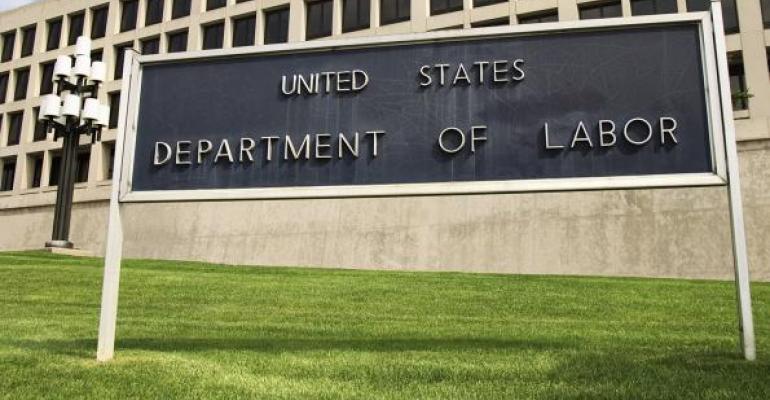Critics of the Department of Labor’s fiduciary exemption proposal said the new rule risks confusing clients.
During a virtual public hearing on Thursday, the critics said clients would be unsure if advisors offering retirement advice in certain situations need to adhere to a fiduciary standard under the new rule, which the Department of Labor created to align with the Securities and Exchange Commission's Regulation Best Interest.
Critics homed in on the reinstatement of the 1975 “five-part” test to determine whether a recommendation should be considered a fiduciary based recommendation under ERISA, as well as the confusion between that standard and the best interest standard codified in Reg BI.
“Not only is the 1975 regulation grossly inadequate, it’s questionable as to who it even applies to and whether or not the minimal duties covered could be stripped away by contracts with unsophisticated investors,” Joseph Peiffer, a member of the board of directors for the Public Investors Advocate Bar Association, said. “Assuming it does apply to a particular advisor, retirement savings will be at greater risk of being plundered than the original DOL rule requiring advisors to put the interests of their clients ahead of their own.”
Originally, the DOL was not planning to hold a public hearing on its proposed rule, which replaced the Obama administration’s fiduciary regulations that were vacated by a federal appeals court in 2018. Though the DOL reversed the decision to hold a meeting, a letter from Sen. Patty Murray (D-Wash.) and Rep. Bobby Scott (D-Va.) urged the DOL to reopen public comments after the hearing to align with past precedent, arguing the proceedings seemed unnecessarily rushed.
“The manner in which the public hearing is structured would cause an unbiased observer to conclude the Department is more concerned with curtailing engagement with the public than receiving feedback from them,” the letter read.
During the hearing, PIABA President Sam Edwards urged the DOL not to reinstate the five-part test, citing the example of a schoolteacher who had saved for retirement to 25 years. He’d lost much of his investments because his financial advisor placed them in conflicted investments, but since those investments were made in only two transactions, the advisor could potentially make the argument that the advice was not given on a “regular” basis, exempting it from needing to adhere to a fiduciary standard.
He said the proposed exemption, which the DOL said was intended to align with Reg BI, was opaque, but he worried that the exemption may be seen as a rule reversal, if it was meant to fall in line with “best interest.” He argued the SEC had made it clear its rule was not considered to be a fiduciary standard.
“We’re talking about a harmonization away from fiduciary to best interest,” he said. “Best interest conveys to the average person the same thing as meaning a fiduciary when it does not.”
Kevin Carroll, a managing director and associate general counsel at the Securities Industry and Financial Markets Association (SIFMA), supported the DOL’s rule, saying SIFMA approved of the reinstatement of the 1975 test and aligning with Reg BI. He disputed the assertion that harmonizing the DOL rule and Reg BI would muddy clients’ understanding of ERISA’s fiduciary rule.
“Reg BI is a very strong standard; it doesn’t use the word fiduciary, but it has the hallmarks of a fiduciary standard,” he argued. “I think the point is fair that it’s functionally equivalent to a fiduciary standard, and for that reason, alignment is appropriate.”
Ronald Rhoades, a professor and director of the personal financial planning program at Western Kentucky University’s Gordon Ford College of Business, criticized the emphasis on ensuring consumer choice. He said Congress did not intend to promote choice in enacting ERISA’s fiduciary standard, hoping instead to eliminate bad investment options. Rhoades also critiqued an emphasis on disclosure to mitigate conflicts in order to meet ERISA’s fiduciary standard and the requirements applicable to garner an exemption.
“I can attest that plan sponsors and plan participants don’t read disclosures. Those few that do don’t understand them,” he said. “If disclosures were effective, there would be no need for the fiduciary standard under the law.”
Since the proposal was released one day prior to Reg BI’s implementation in late June, there’s been little time for the DOL to determine what impact that rule could have on how firms conduct business. This could also impact how firms comply with the DOL’s own proposal, said Barbara Roper, the director of investor protection at the Consumer Federation of America.
“In particular, there hasn’t been time to fully assess whether Reg. BI has caused firms to abandon incentive practices that the Department has previously determined, as part of the regulatory record for this proposal, are likely to induce financial professionals to base their recommendations on their own interests, rather than their customers’ best interests,” she said.
Mark Quinn, the director of regulatory affairs for Cetera Financial Group, said the firm agreed with the overall approach embedded in the DOL’s class exemption and argued for its adoption. He also expressed support for making sure the proposed DOL rule aligned with Reg BI.
“Reg BI establishes a comprehensive framework of investor protection,” he said. “An adoption of standards that conflict with Reg BI would be confusing for clients and make it difficult for advisors to offer the holistic advice that most clients seek.”
The DOL will now finalize its rule to be sent to the White House for approval. The Trump administration is under a tight deadline to pass the rule soon; if President Donald Trump were to lose the election, it would mean the DOL would have only until Inauguration Day to pass the rule.
Additionally, if a rule is finalized and on the federal register for less than 60 days, an incoming administration would be able to reverse the rule without going through an elongated regulatory process, according to Bradford Campbell, a partner in Drinker Biddle’s Employee Benefits and Executive Compensation Group.





